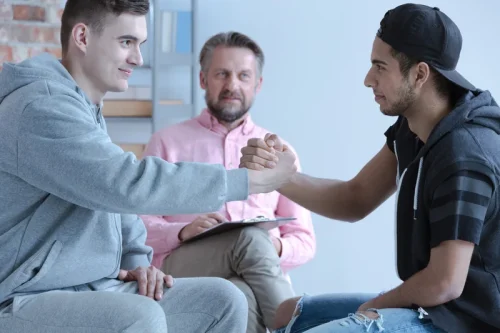
Typical DBT treatment plans require you to undergo three to four hours a week of individual and group therapy, not including the time needed to complete homework assignments from your therapy team. These large investments of time and resources may be a barrier to treatment for some people. Acceptance is also an important part of the client-therapist relationship. Clients need to feel nonjudgmentally accepted by their therapist before they can pursue change. Because of this foundation of acceptance, DBT may be effective for people who initially resist therapy. Talk to your healthcare provider if you are considering dialectical behavioral therapy and they can help you determine if it’s a good fit.

Dialectical Behavior Therapy for Teens
Dialectical behavior therapy is a type of therapy that was developed from cognitive behavioral therapy. It involves distress tolerance, mindfulness, emotional regulation, and interpersonal effectiveness skills. Although designed for people with suicidal behaviors, self-harm behaviors, and borderline personality disorder, it is an effective treatment for many other mental health disorders. Dialectical Behavior Therapy (DBT) is a cognitive-behavioral treatment developed by Dr. Marsha Linehan. Primarily used for individuals with borderline personality disorder, DBT emphasizes the balance between acceptance and change. It incorporates mindfulness, emotion regulation, distress tolerance, and interpersonal effectiveness skills to help clients manage emotions, improve relationships, and reduce self-destructive behaviors.
Brain Emotion Circuitry-Targeted Self-Monitoring and Regulation Therapy (BE-SMART)
Findings indicated that a larger proportion of DBT patients were in remission from depression at post-treatment and at the six-month follow-up period. DBT uses a more collaborative approach, allowing clients to work with individual therapists, group leaders, and fellow group therapy members, while therapists also work together. ACT therapy usually takes place in the context https://ecosoberhouse.com/ of one client and their therapist, though more ACT groups are becoming available and may offer additional support. DBT therapists recognize four stages of treatment, each one marked by the level of distress the client is facing.3 Clients don’t have to go through all the stages, but in order to tailor treatment it’s helpful to identify which stage a person is in.
Is DBT effective for treating BPD?
In all, it takes around six months to complete the skills training modules following the standard DBT schedule. The modules are often repeated, however, meaning that many people spend a year or longer in a DBT program. Emotion regulation skills help you label your emotions without judging them.
Mental Health
- The primary focus of DBT is learning coping strategies moving forward in life, rather than spending a lot of time discussing past events that led up to current issues.
- Part of this process involves offering validation, which helps people become more likely to cooperate and less likely to experience distress at the idea of change.
- DBT is typically used for individuals who have multiple mental health issues.
- Dialectical behavioral therapy is a specific type of psychotherapy that requires additional training by mental health professionals.
- Because this approach to therapy is able to help people successfully improve their coping skills, they are able to develop effective ways to manage and express strong emotions.
Evidence also indicates that DBT skills reduce depressive symptoms and improve affective control and mindfulness self-efficacy for those with bipolar disorder (Van Dijk et al., 2013). An example of this is daily ‘diary cards,’ which are used to track emotions, behaviors, and thoughts. Learning to regulate emotions is a component of DBT that aims to help individuals be more comfortable and accepting of their own emotions.

Life-threatening or self-injurious behavior takes priority, not surprisingly. The therapist and patient discuss more skillful ways to solve emotional and life problems. A dialectical behavioral therapist can help you learn to replace ineffective behaviors and thoughts with more effective ones dialectical behavioral therapy so you can manage life’s stressors and difficult emotions. Each individual therapy session is structured around a diary card that the patient brings to the session, which is like a weekly tracker of their emotions and their urges to engage in whatever their problematic behaviors are.

Distress tolerance skills help you get through rough patches without turning to potentially destructive coping techniques. Mindfulness is about being aware of and accepting what’s happening in the present moment. This can help you learn to notice and accept your thoughts and feelings without judgement.
What is dialectical behavior therapy?
DBT can be provided by a range of mental health professionals including psychologists, psychiatrists, licensed clinical social workers (LCSW), licensed marriage and family therapists (LMFT), and licensed professional counselors (LPC), among others. It is recommended that people seeking treatment find a licensed mental health professional who has completed a specialized DBT training or certificate program. The information on the diary card lets the therapist know how to allocate session time.
What Does Dialectical Behavior Therapy Do?

Over the last several decades, a great deal of research has supported the efficacy of DBT. This form of therapy is now practiced in dozens of countries around the world. It is also listed in SAMHSA’s Registry of Evidence-Based Programs and Practices.

So this type of therapy is centered on helping you accept yourself as you are while also trying to change. For example, a 2014 study looked at how 47 people with BPD responded to DBT. After a year of treatment, 77 percent no longer met the diagnostic criteria for BPD. During skills group, you’ll learn about and practice each skill, talking through scenarios with other people in your group.
